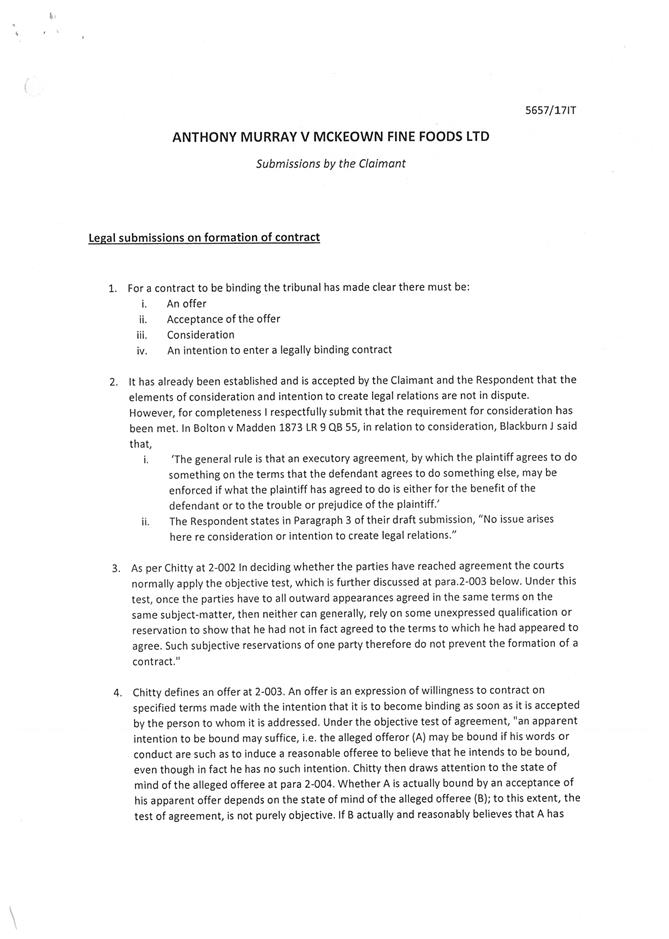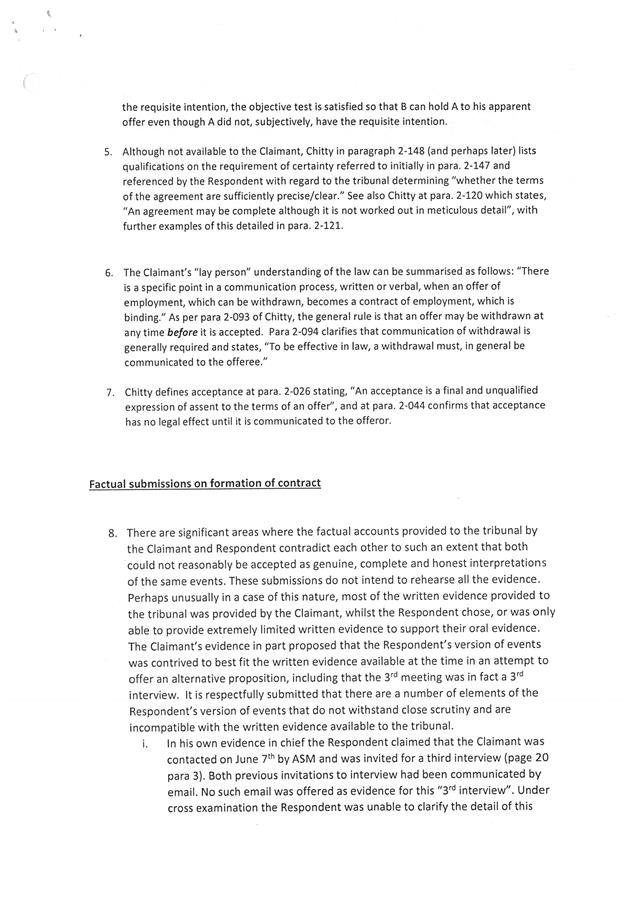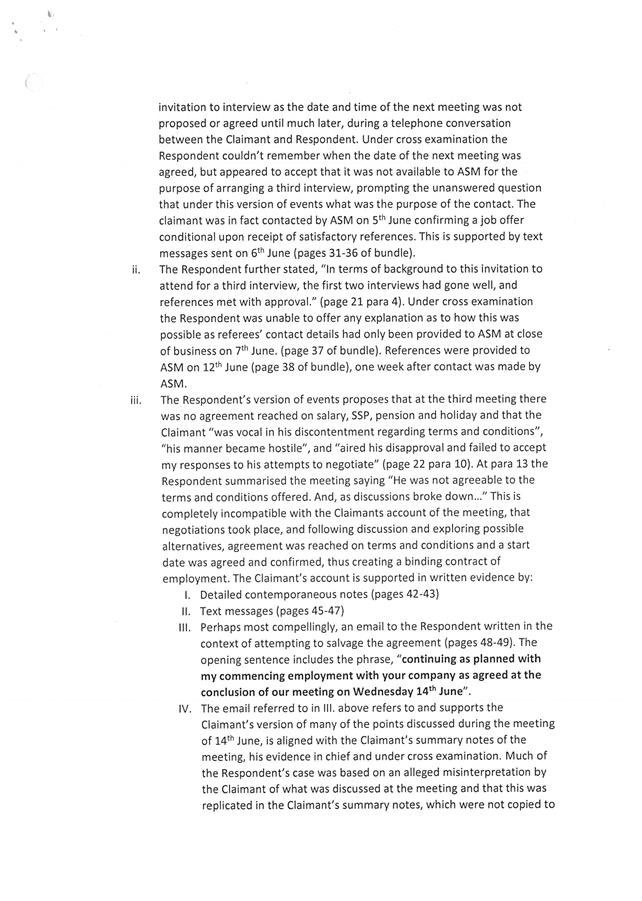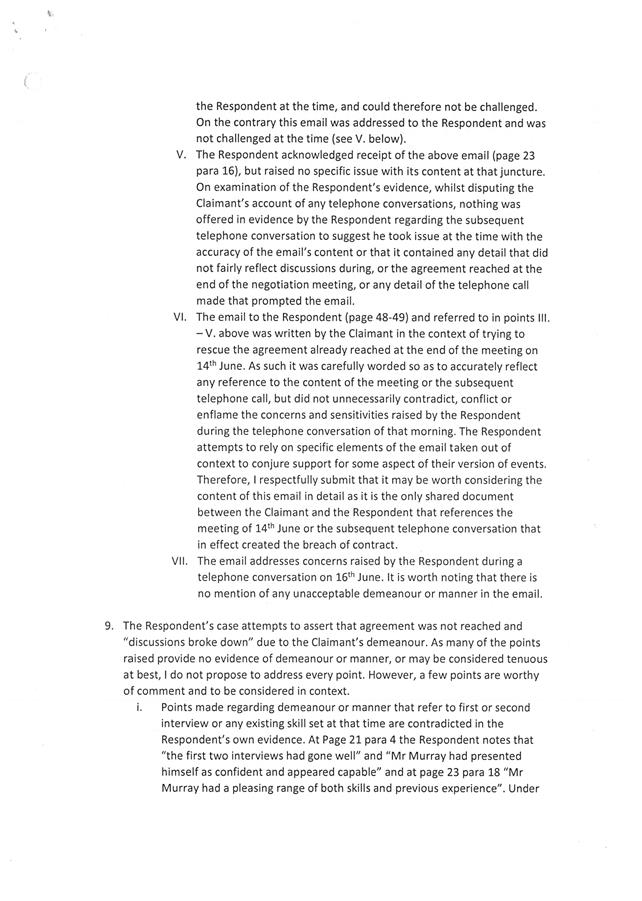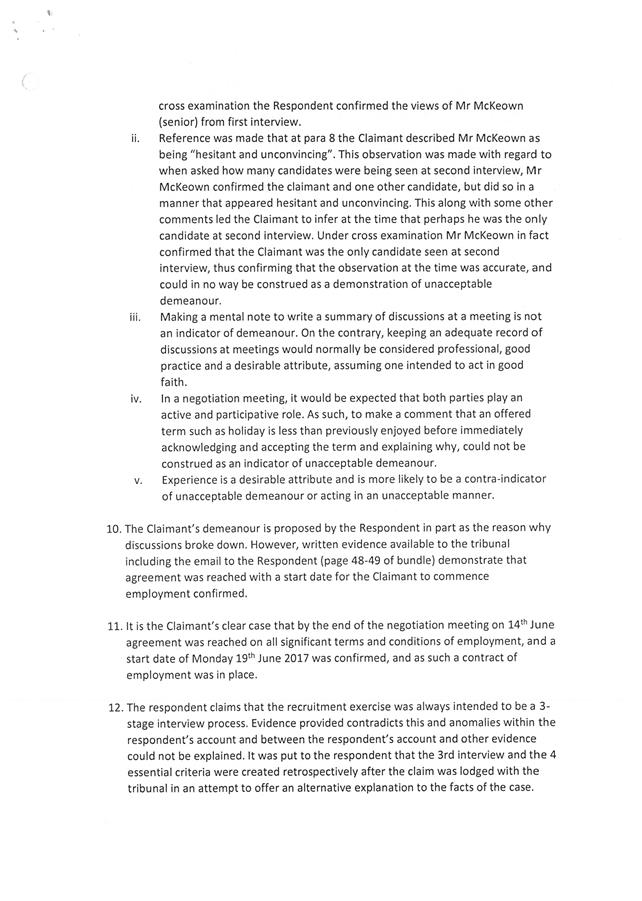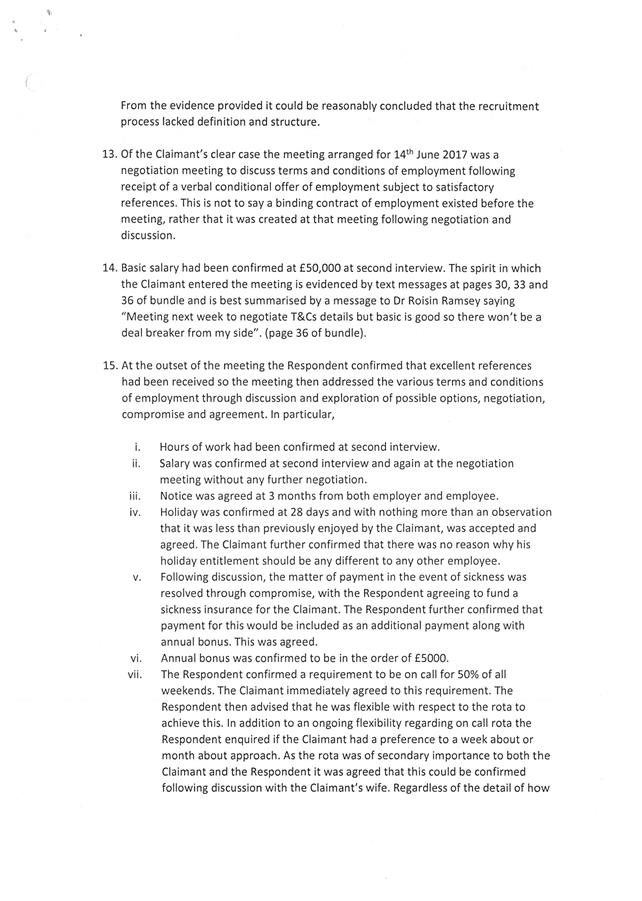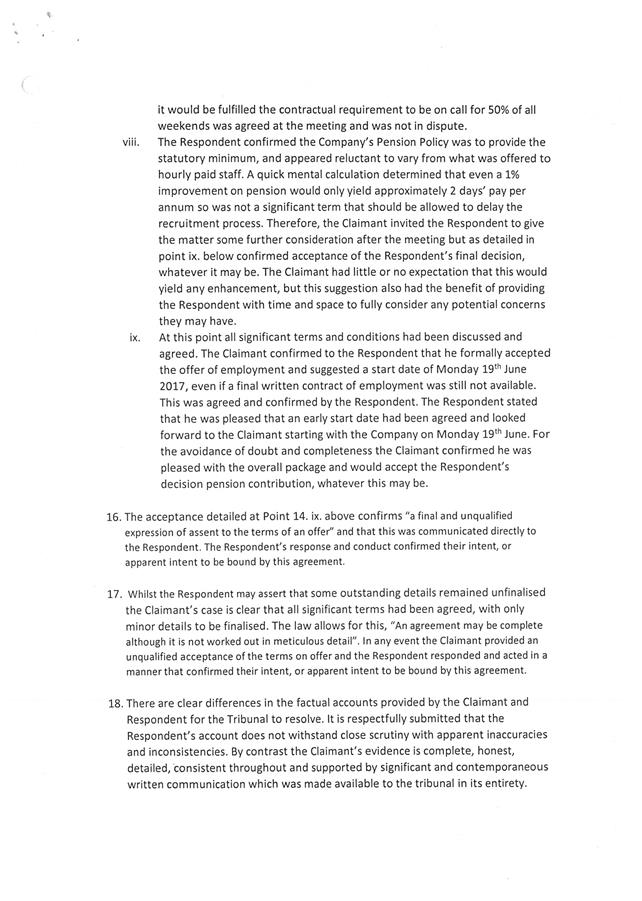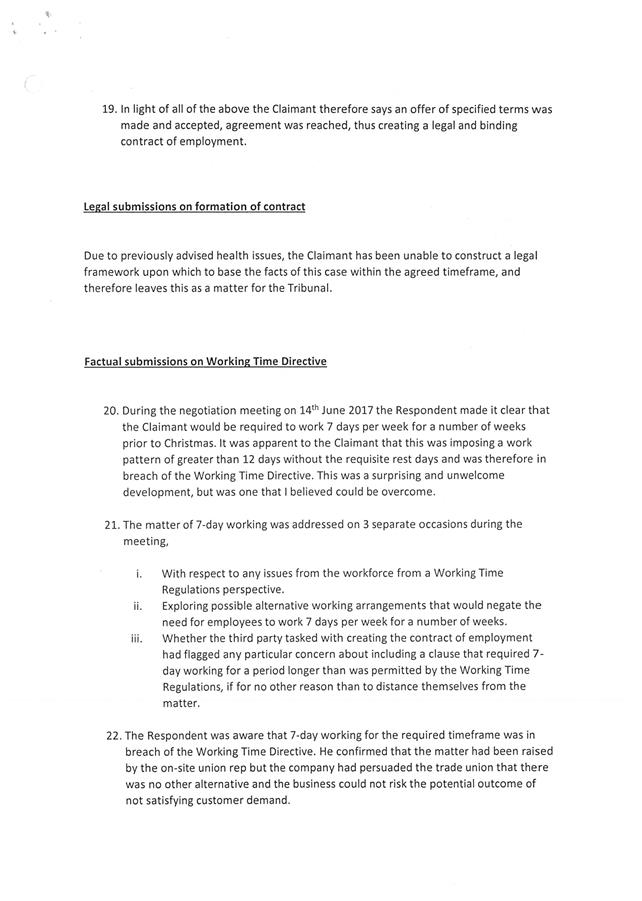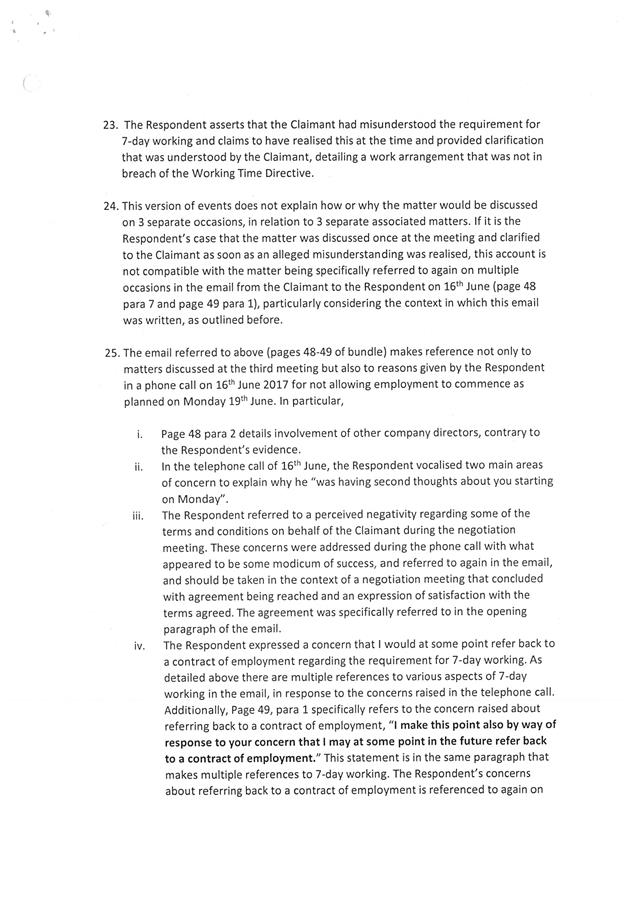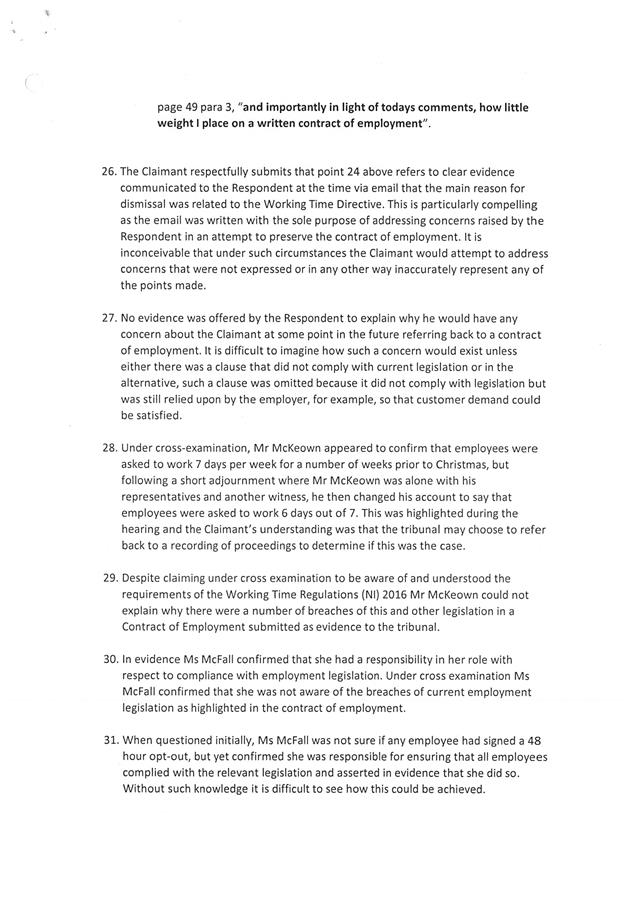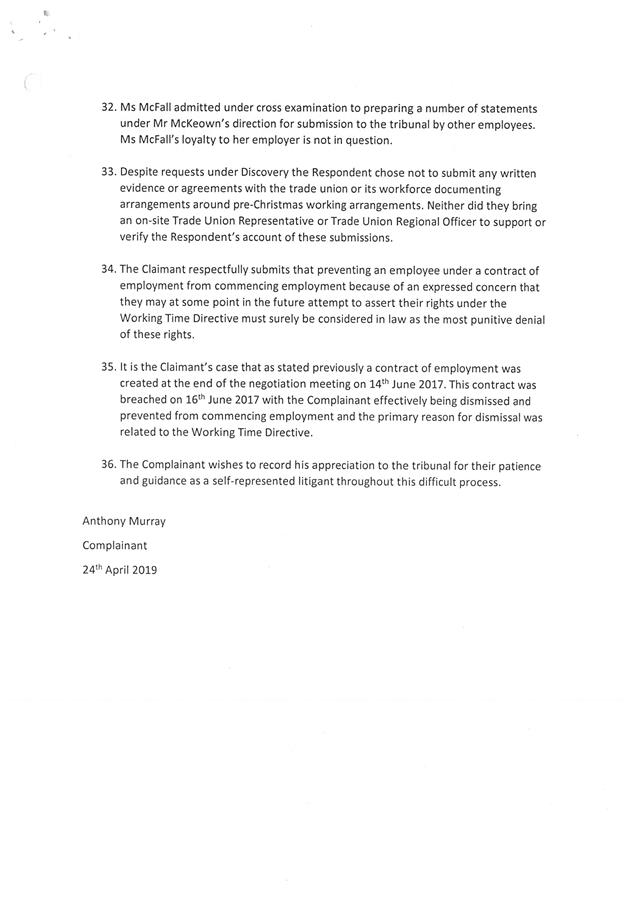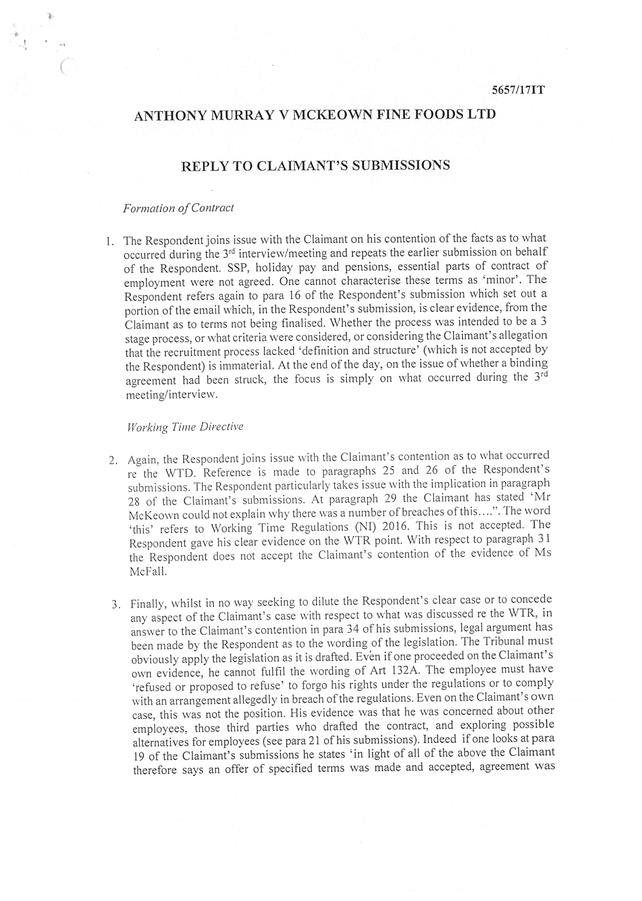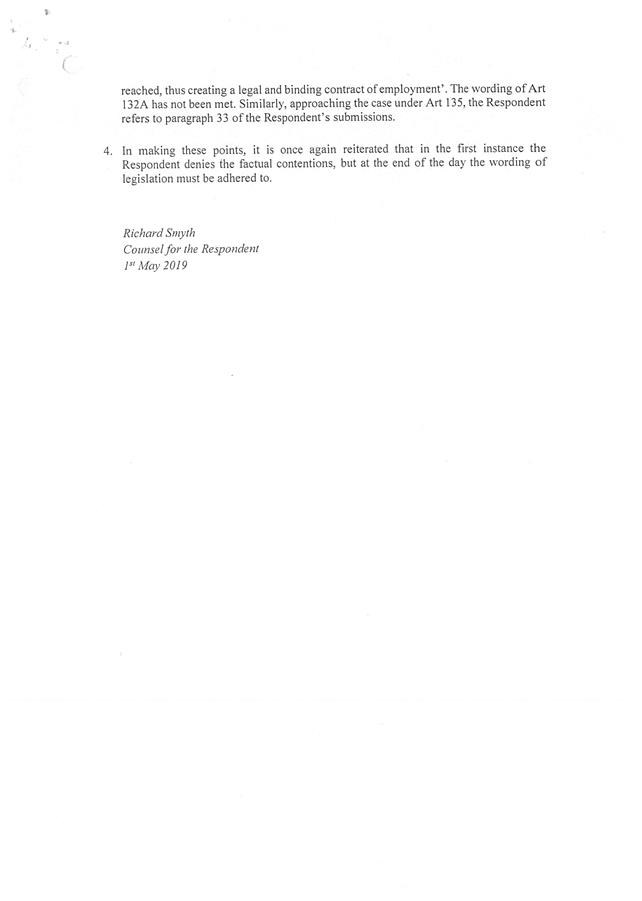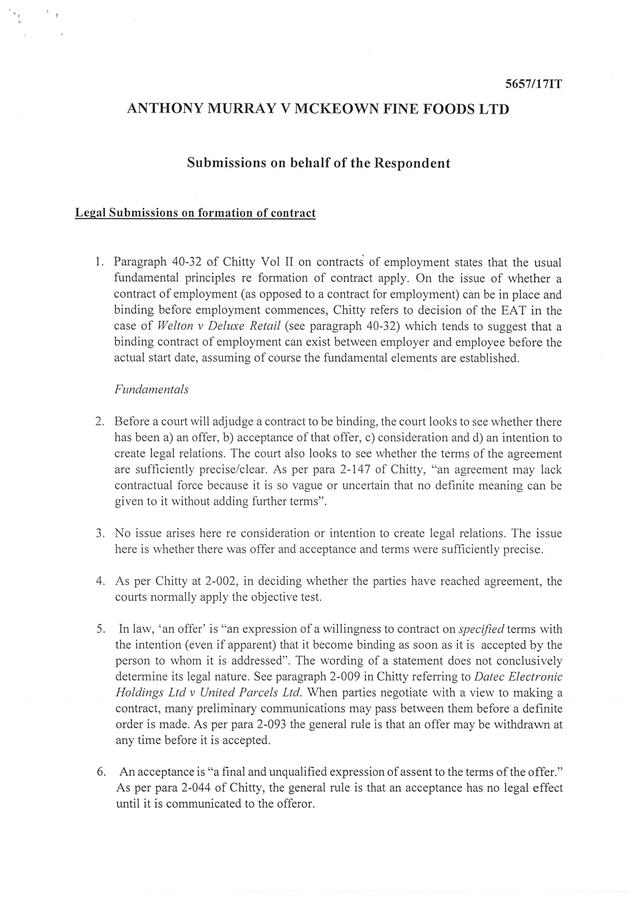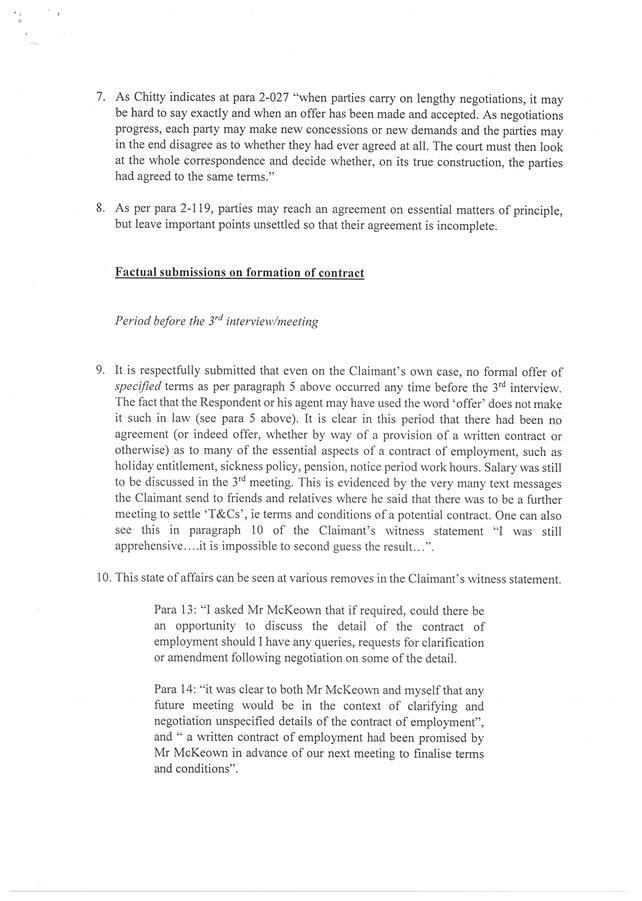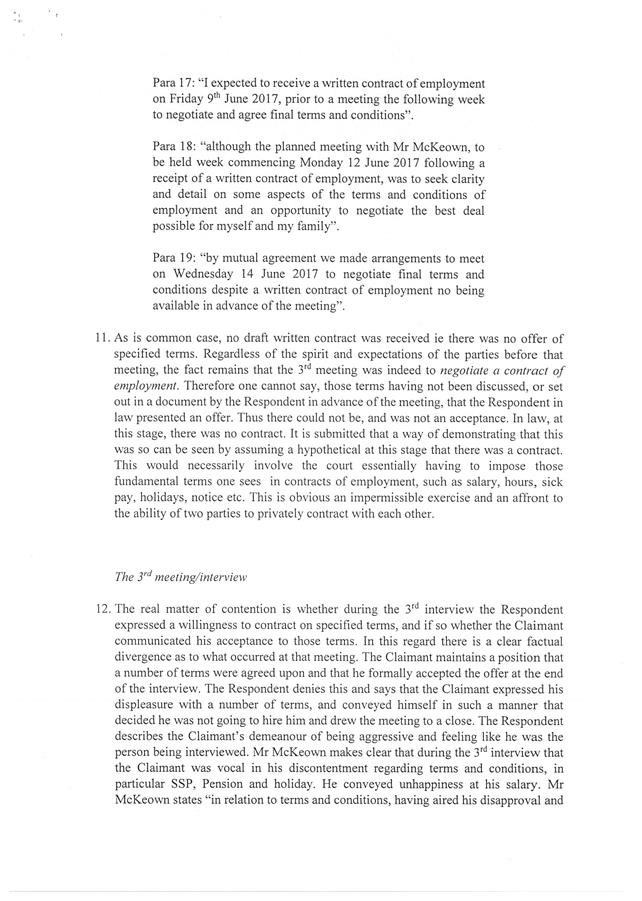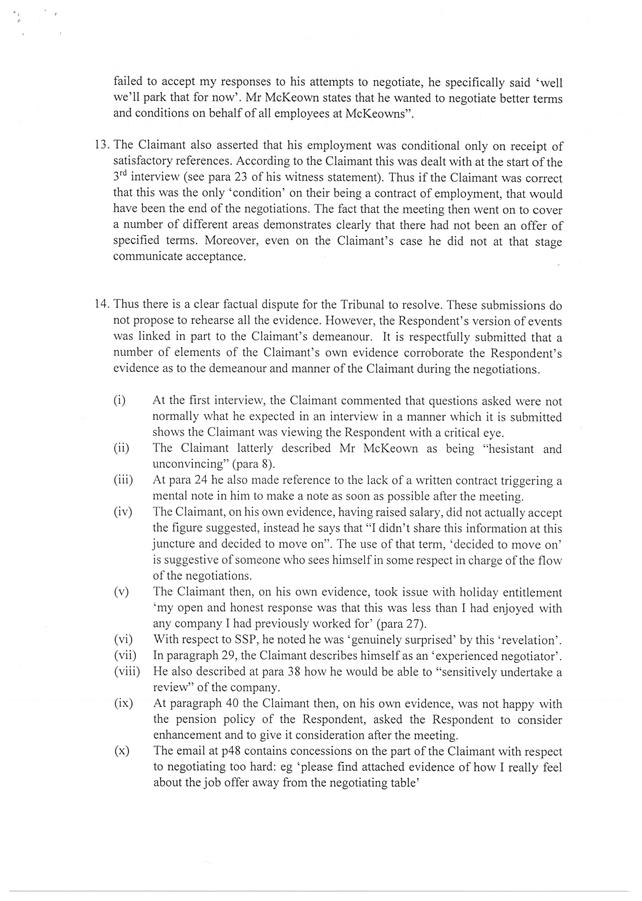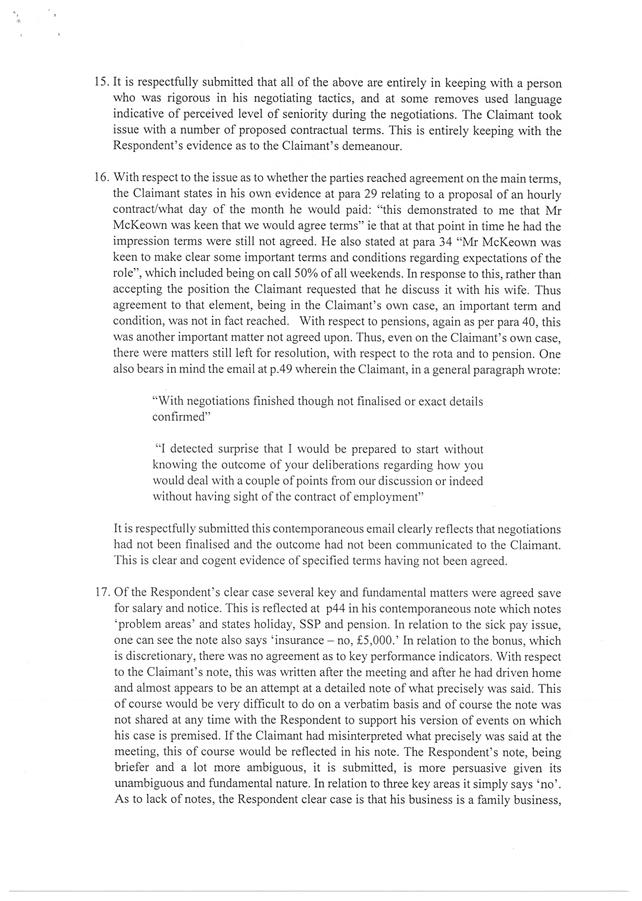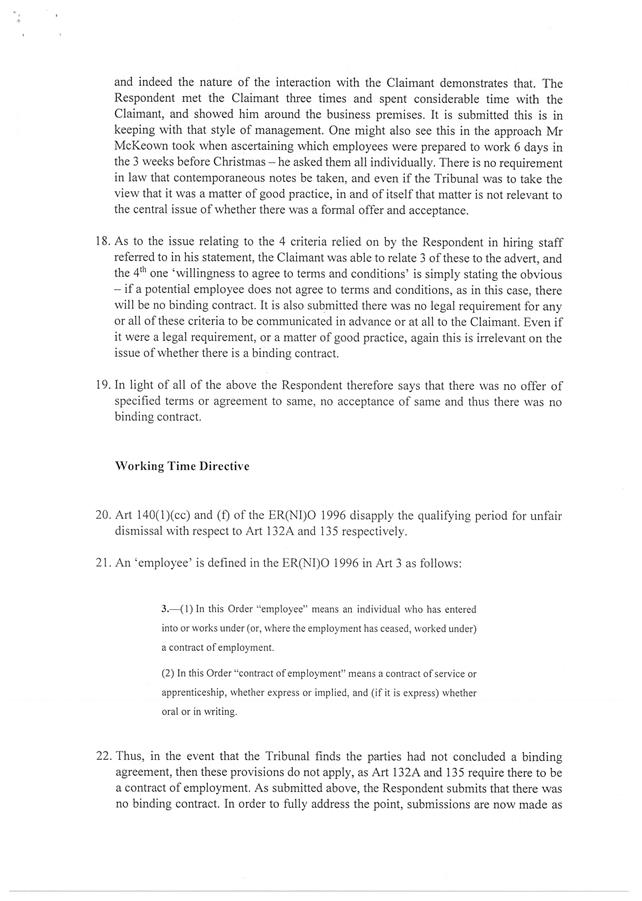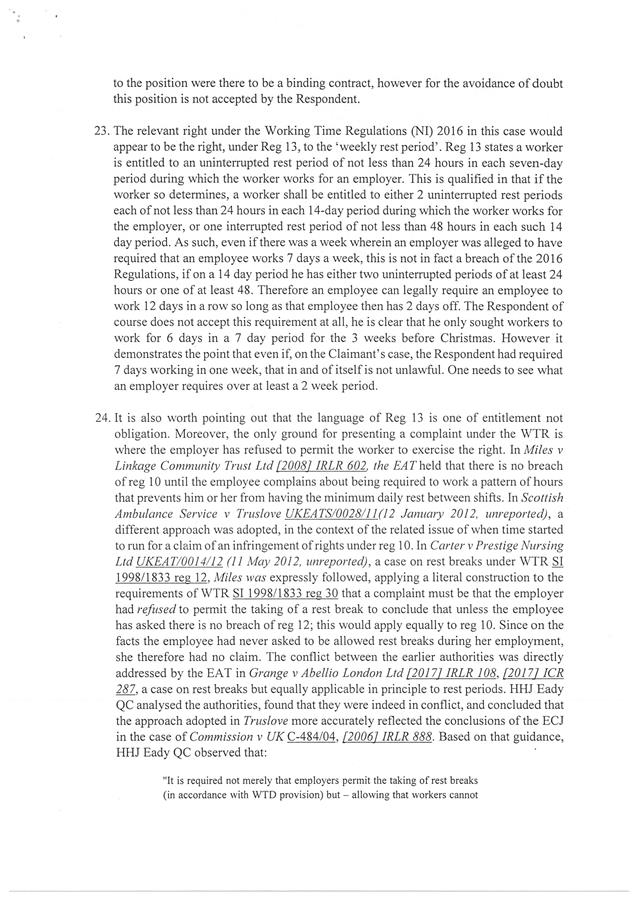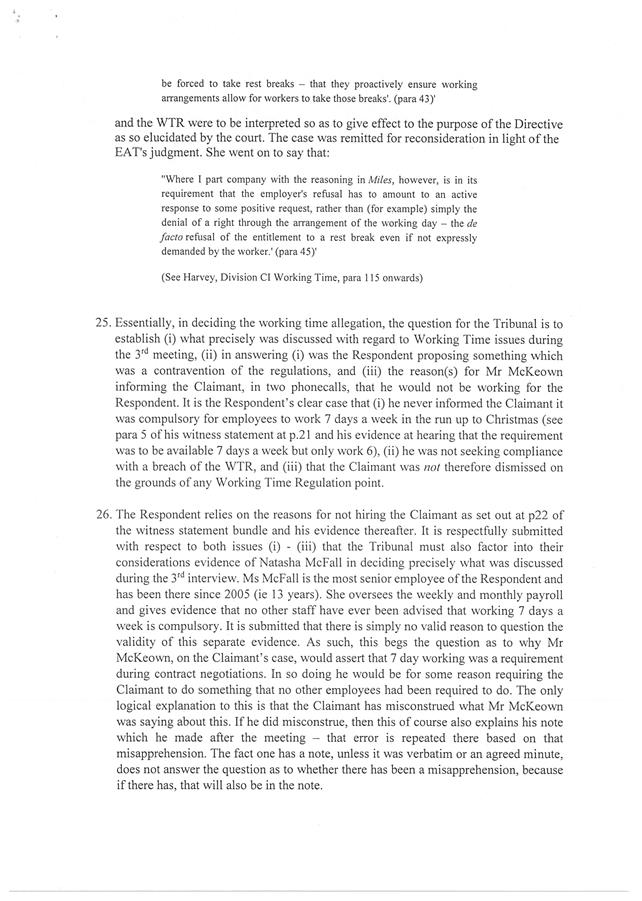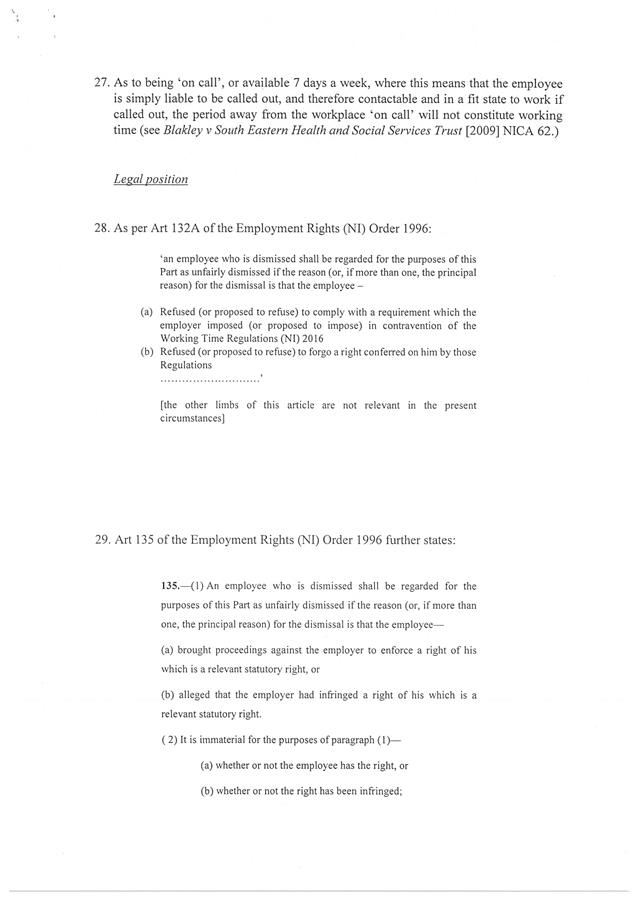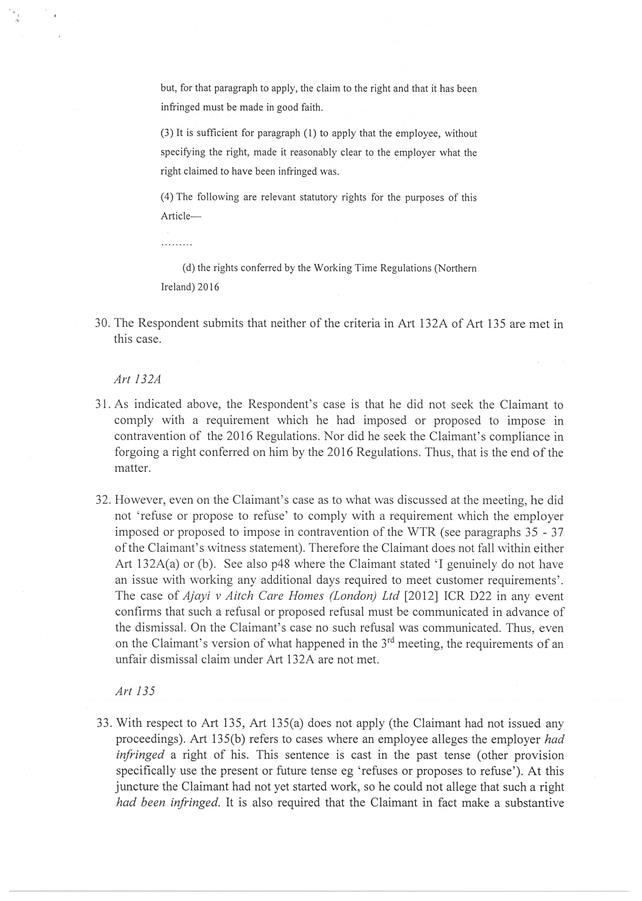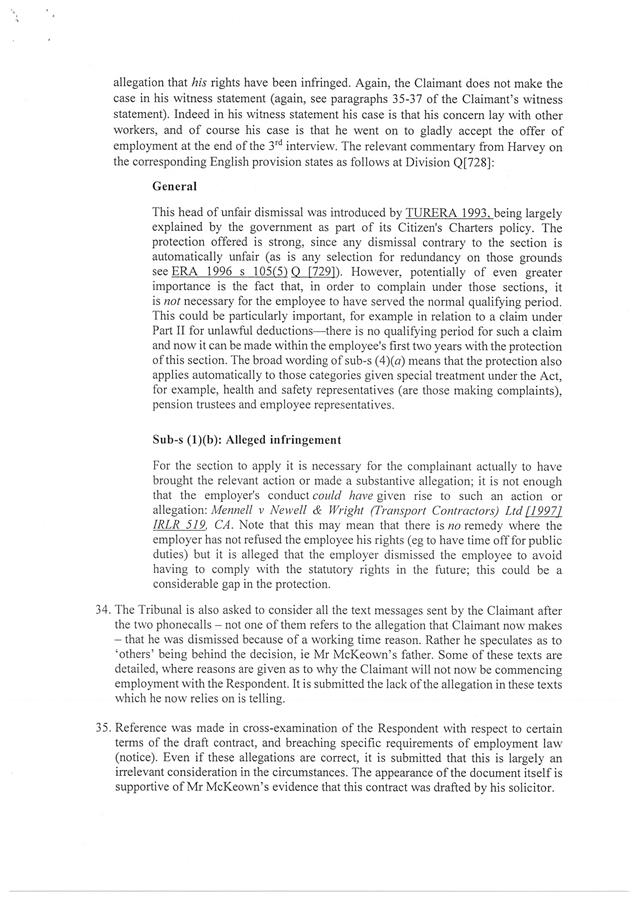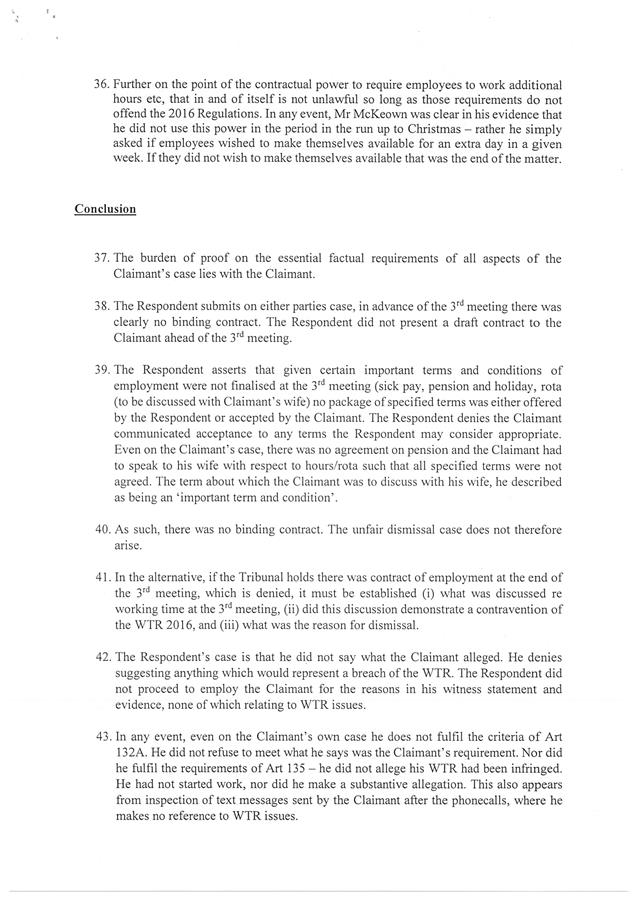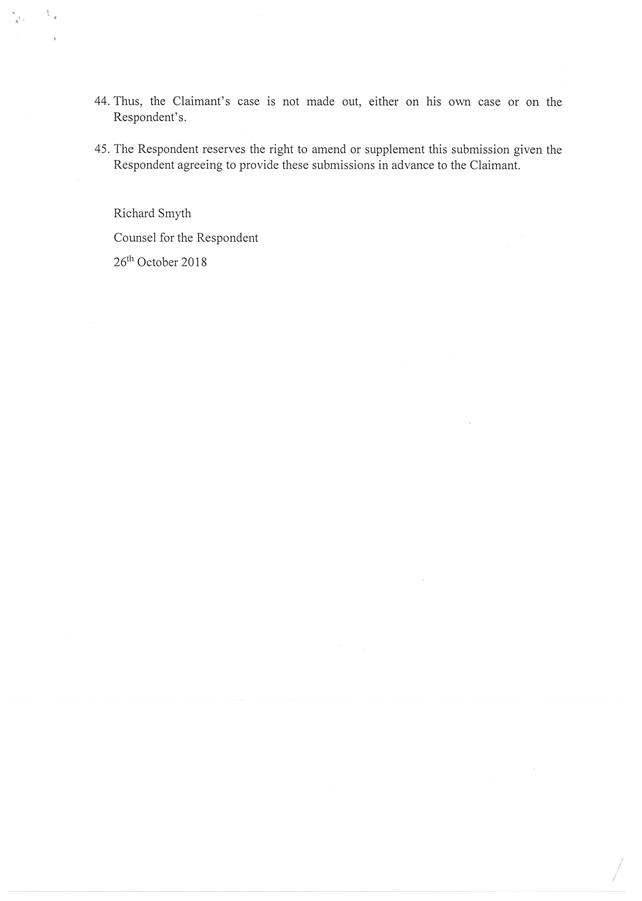Freely Available British and Irish Public Legal Information
[Home] [Databases] [World Law] [Multidatabase Search] [Help] [Feedback]
Industrial Tribunals Northern Ireland Decisions
You are here: BAILII >> Databases >> Industrial Tribunals Northern Ireland Decisions >> Murray v McKeown Fine Foods Ltd (Breach of Contract Working Time Regulations) [2019] NIIT 05657_17IT (30 July 2019)
URL: http://www.bailii.org/nie/cases/NIIT/2019/05657_17IT.html
Cite as: [2019] NIIT 5657_17IT, [2019] NIIT 05657_17IT
[New search] [Printable PDF version] [Help]
THE INDUSTRIAL TRIBUNALS
CASE REF: 5657/17
CLAIMANT: Anthony Murray
RESPONDENT: McKeown Fine Foods Ltd
DECISION
The unanimous decision of the tribunal is that the claimant was not automatically unfairly dismissed, but that he was dismissed without notice or pay in lieu thereof, in breach of his contract of employment. His claims for unfair dismissal, detriment contrary to the Working Time Regulations (Northern Ireland) 2016 and holiday pay are dismissed. The tribunal awards the net sum of £6,133.51 for breach of contract.
CONSTITUTION OF TRIBUNAL
Employment Judge: Employment Judge Gamble
Members: Mr I Atcheson
Mr N Jones
APPEARANCES:
The claimant represented himself.
The respondent was represented by Mr R Smyth, of counsel, instructed by Edwards & Co Solicitors.
BACKGROUND
1. The claimant lodged his complaint to the Industrial Tribunal on 16 September 2017. In that complaint, he alleged that he had been automatically unfairly dismissed, that he had been subject to a detriment under the Working Time Regulations, that there had been a breach of contract in relation to failure to pay Notice Pay and that he was owed holiday pay.
2. The respondent lodged a response on 1 December 2017 which denied the claimant’s allegations in their entirety
3. It was common case that the claimant had applied for the post of Operations Manager (“the post”) with the respondent company, following his having been made redundant by his previous employer. The claimant had attended interviews on 26 May 2017 and on 2 June 2017 for the post. The respondent had engaged the services of ASM accountants to carry out the recruitment exercise for the post.
4. The claimant did not commence employment with the respondent.
5. The claimant asserts that a contract of employment had been entered into between the respondent and him, and that he was dismissed from this contract for reasons which are automatically unfair and which do not require a period of qualifying service. The claimant further asserts that he was entitled to 3 months’ notice as he alleges that this had been agreed as a contractual term.
6. The respondent denies that a contract of employment had been entered into. It was its position that the claimant had attended three separate interviews, and was unsuccessful in securing the post. It is the respondent’s case that the claimant was not offered the post as he did not fulfil the essential criteria for appointment.
SOURCES OF EVIDENCE
7. The tribunal considered a witness statement and heard evidence from the claimant, in support of his case; the tribunal also considered a witness statement and heard evidence from Damian McKeown, the Managing Director of McKeown Fine Foods Ltd, and Natasha McFall in support of the respondent’s case. Although witness statements were received from Adrian Bodi and Anna Kuminiarczyk, these witnesses did not attend the hearing and were not cross examined. In light of their non-attendance and Ms McFall’s evidence regarding her having prepared their witness statements, the tribunal attached no weight to those statements.
8. The tribunal also considered a bundle of documents which had been exchanged between the parties.
9. The tribunal did not hear evidence from any person from ASM accountants who undertook the recruitment exercise.
SUBMISSIONS
10. After the conclusion of the hearing, the parties agreed to provide written submissions for the tribunal’s consideration. These submissions are attached to this decision. It was agreed that the respondent would lodge its submission first as the claimant was unrepresented. The respondent’s submission was lodged on 24 October 2018. Extensions were granted for the lodging of the claimant’s written submission as regrettably he suffered a serious illness following the conclusion of the hearing. His written submission was received on 24 April 2019, and a reply to the claimant’s submission was served on 1 May 2019. The tribunal is grateful for the parties’ carefully constructed, detailed and apposite legal and factual submissions, which were of considerable assistance to the tribunal.
THE ISSUES
11. It was agreed that it was necessary for the tribunal to determine the following issues in order to consider the claim:
1. Had the claimant entered into a contract of employment with the respondent?
2. If there was a contract of employment entered into between the parties, did same entitle the claimant to 3 months’ notice upon termination?
3. Subject to (1) above, was the claimant dismissed principally for a reason which fell within Article 132A and/or Article 135 of the Employment Rights (Northern Ireland) Order 1996?
4. Subject as above, what is the appropriate remedy?
MATTERS OF DISPUTE BETWEEN THE PARTIES
12. The main matters of dispute between the parties were as follows:
12.1 Whether the meeting of 14 June 2017 was a third interview or a meeting to finalise terms.
12.1.1 The claimant’s case was that the meeting of 14 June 2017 was convened at his request to negotiate and finalise terms.
12.1.2 The respondent’s case was that the meeting of 14 June 2017 was a third interview at which the claimant was unsuccessful.
12.2 Whether a binding contract was agreed orally between the parties at the meeting of 14 June 2017.
12.2.1 The claimant’s case was that agreement was reached and it was agreed that he would commence work the following Monday.
12.2.2 The respondent’s case was that no meeting of minds took place and the negotiations broke down before any binding agreement was entered into.
12.3 Whether there was an offer which was withdrawn before acceptance; Or whether the claimant was dismissed following acceptance of an offer and the formation of a contract.
12.3.1 The claimant’s case was that he had agreed to commence work and then the respondent resiled from the agreement. The claimant asserts that this was because he had queried the respondent’s factory practices after he was told of a requirement for 7 day working in the busy Christmas period.
12.3.2 The respondent’s case was that no final offer of terms was made, as negotiations broke down. The respondent asserts it did not appoint the claimant because of his demeanour and because Mr McKeown did not believe the claimant could form an effective working relationship with him.
12.4 Whether the respondent had imposed or proposed to impose a requirement in contravention of the Working Time Regulations (Northern Ireland) 2016 in respect of the claimant.
12.4.1 The claimant’s case is that he was advised of a requirement for 7 day working which he had queried as constituting a breach of the Working Time Regulations (Northern Ireland) 2016 and had proposed to review the arrangements for the respondent’s staff as part of his role.
12.4.2 The respondent’s case is that his arrangements for Christmas production are not in breach of the Working Time Regulations (Northern Ireland) 2016 and that he did not lay down any requirement for the claimant which would have constituted such a breach.
12.5 Whether the claimant had refused or proposed to refuse to comply with any such requirement;
12.6 Whether the claimant had made an allegation that the respondent had infringed a statutory right of his; and
12.7 (Subject as above) what was the reason (or primary reason) for the claimant’s dismissal.
THE RELEVANT LAW
13. Industrial Tribunals Extension of Jurisdiction Order (Northern Ireland) 1994
Extension of jurisdiction
“3. Proceedings may be brought before an industrial tribunal in respect of a claim of an employee for the recovery of damages or any other sum (other than a claim for damages, or for a sum due, in respect of personal injuries) if-
(a) the claim is one to which Article 57(2) of the No. 2 Order applies and in respect of which a court in Northern Ireland would under the law for the time being in force have jurisdiction to hear and determine an action;
(b) the claim is not one to which Article 5 applies; and
(c) the claim arises or is outstanding on the termination of the employee's employment.”
Limit on payment to be ordered
“10. An industrial tribunal shall not in proceedings in respect of a contract claim, or in respect of a number of contract claims relating to the same contract, order the payment of an amount exceeding £25,000.”
Employment Rights (Northern Ireland) Order 1996
Employees, workers
“3.— (1) In this Order “employee” means an individual who has entered into or works under (or, where the employment has ceased, worked under) a contract of employment.
(2) In this Order “contract of employment” means a contract of service or apprenticeship, whether express or implied, and (if it is express) whether oral or in writing.”
The right
“126.—(1) An employee has the right not to be unfairly dismissed by his employer.
(2) Paragraph (1) has effect subject to the following provisions of this Part (in particular Articles 140 to 144).”
Working time cases
“132A.—(1) An employee who is dismissed shall be regarded for the purposes of this Part as unfairly dismissed if the reason (or, if more than one, the principal reason) for the dismissal is that the employee—
(a) refused (or proposed to refuse) to comply with a requirement which the employer imposed (or proposed to impose) in contravention of the Working Time Regulations (Northern Ireland) 2016 ,
(b) refused (or proposed to refuse) to forgo a right conferred on him by those Regulations,
(c) failed to sign a workforce agreement for the purposes of those Regulations, or to enter into, or agree to vary or extend, any other agreement with his employer which is provided for in those Regulations, …”
Assertion of statutory right
“135.—(1) An employee who is dismissed shall be regarded for the purposes of this Part as unfairly dismissed if the reason (or, if more than one, the principal reason) for the dismissal is that the employee-
…
(b) alleged that the employer had infringed a right of his which is a relevant statutory right.
(2) It is immaterial for the purposes of paragraph (1)—
(a) whether or not the employee has the right, or
(b) whether or not the right has been infringed; but, for that paragraph to apply, the claim to the right and that it has been infringed must be made in good faith.
(3) It is sufficient for paragraph (1) to apply that the employee, without specifying the right, made it reasonably clear to the employer what the right claimed to have been infringed was.
(4) The following are relevant statutory rights for the purposes of this Article—
…
(d) the rights conferred by the Working Time Regulations (Northern Ireland) 2016 …”
Qualifying period of employment
“140.—(1) Article 126 does not apply to the dismissal of an employee unless he has been continuously employed for a period of not less than one year ending with the effective date of termination.
…
(3) Paragraph (1) does not apply if—
…
(cc) Article 132A applies,
…
(f) paragraph (1) of Article 135 (read with paragraphs (2) and (3) of that Article) applies, …”
14. Working Time Regulations (Northern Ireland) 2016
Weekly rest period
“(1) Subject to paragraph (2), a worker is entitled to an uninterrupted rest period of not less than 24 hours in each seven-day period during which the worker works for an employer.
(2) If the employer so determines, a worker shall be entitled to either—
(a) two uninterrupted rest periods each of not less than 24 hours in each 14-day period during which the worker works for the employer; or
(b) one uninterrupted rest period of not less than 48 hours in each such 14-day period,
in place of the entitlement provided for in paragraph (1) …”
RELEVANT LAW – CONTRACT FORMATION
15. The first legal issue to be determined by the panel is whether the claimant was an employee for the purposes of the Employment Rights (Northern Ireland) Order 1996. If the claimant was not an employee, he could have no protection from unfair dismissal (whether subject to a qualifying period of service or not). Further, if there was no employment contract, no claim for breach of that contract arises in relation to failure to pay notice pay.
16. Article 3(1) of the 1996 Order provides that an individual claimant may enjoy the protection afforded by the provisions of the Employment Rights (Northern Ireland) Order 1996 if he has entered into a contract of employment. Article 3(2) establishes that such a contract of employment may be implied and further that it may be oral. Accordingly, it is not necessary for the agreed contractual provisions to have been reduced to writing in order to be enforceable.
17. In relation to the issue of the formation of an employment contract, the provisions of contract law apply.
18. Chitty on Contracts, thirty second edition, Volume 1, confirms the requirements for an enforceable contract. “Generally speaking, the law regards an agreement as having been reached when an offer made by one of the parties (the offeror) is accepted by the other to whom the offer is addressed (the offeree or acceptor). However, such an agreement may still lack contractual force because it is incomplete, because its terms are not sufficiently certain, because its operation is subject to a condition which fails to occur or because it was made without any intention to create legal relations. An agreement may also lack contractual force for want of consideration.” Para 2-001. Further, in deciding whether the parties have reached an agreement, an objective test is applied.
19. Lord Clarke stated in RTS Flexible Systems Ltd v Molkerei Alois Mueller GmbH and Co KG (UK) Productions [2010] UKSC 14; [2010] 1 WLR 753, at para 45:
"Whether there is a binding contract between the parties and, if so, upon what terms depends upon what they have agreed. It depends not upon their subjective state of mind, but upon a consideration of what was communicated between them by words or conduct, and whether that leads objectively to a conclusion that they intended to create legal relations and had agreed upon all the terms which they regarded or the law requires as essential for the formulation of legally binding relations."
20. In Jeffrey Ross Blue v Michael James Wallace Ashley (2017) the requirements for contractual formation were reviewed:
“49. Generally speaking, it is possible under English law to make a contract without any formality, simply by word of mouth. Of course, the absence of a written record may make the existence and terms of a contract harder to prove. Furthermore, because the value of a written record is understood by anyone with business experience, its absence may – depending on the circumstances – tend to suggest that no contract was in fact concluded. But those are matters of proof: they are not legal requirements. The basic requirements of a contract are that: (i) the parties have reached an agreement, which (ii) is intended to be legally binding, (iii) is supported by consideration, and (iv) is sufficiently certain and complete to be enforceable
…
63. In determining whether an agreement has been made, what its terms are and whether it is intended to be legally binding, English law applies an objective test …
As with all questions of meaning in the law of contract, the touchstone is how the words used, in their context, would be understood by a reasonable person. For this purpose the context includes all relevant matters of background fact known to both parties.”
21. In the Blue case, the court concluded that no contract had been entered into, outlining eight reasons. The setting of the meeting was an ‘unlikely’ place for those concerned to be negotiating Mr Blue’s contractual bonus; the purpose of the occasion was not to discuss Mr Blue’s remuneration; the nature and tone of the conversation meant that nobody “could reasonably have understood this to be a serious business discussion”; the agreement did not make any commercial sense to Mr Ashley (or at least he had no reason to make such agreement); the ‘incongruity’ of Mr Blue’s role (i.e. it is questionable what he would do to change the share prices); vagueness of the ‘offer’ (i.e. there was no consideration as to what Mr Blue would need to do in order to receive the payment or how his work would be measured – added to which there was no specified period in which the target price should be achieved); the perceptions of witnesses (nobody thought Mr Ashley was being serious when he made the offer); and that Mr Blue did not consider there to be an intention to create a legally binding contract at that point, otherwise he would made a written record.
22. In addition, it is possible for a contract to be made conditional, by way of a condition precedent where a contract is only formed upon fulfilment of the relevant condition. In the case of Wishart v National Association of Citizens Advice Bureaux Ltd (1990) IR LR 393 an offer of employment was made subject to receipt of satisfactory references. It is also possible for a contract to be formed subject to a condition subsequent, where the contract determines upon the occurrence of the condition.
23. Both Article 3(2) of the Employment Rights (Northern Ireland) Order 1996 and case law make it clear that an employment contract can be oral (see Ferguson v John Dawson & Partners (Contractors) Ltd [1976] IRLR 346). There is no requirement for the contractual terms to be reduced to writing prior to the employment commencing. Article 33(2) of the 1996 Order establishes the requirement for an employer to provide an employee with a written statement of particulars of employment not later than two months after the beginning of the employment. Article 33(4) contains the requisite particulars which comprise the statement.
24. Once an employee has accepted an offer unconditionally, the contract becomes binding and the employer can no longer unilaterally withdraw the offer. This is still the case even when an employee has not yet started working under the contract. In the case of Sarker v South Tees Acute Hospitals NHS Trust 1997 ICR 673, which involved a breach of contract claim (for which no qualifying period of service is necessary), the EAT found that the proper construction of an arrangement where employment had been offered and accepted in August but the start date was October was that the contract of employment had been formed in August and that the parties had merely agreed to delay its performance. This analysis was approved by the President of the EAT Mr Justice Langstaff in the case of Welton v Deluxe Retail Ltd trading as Madhouse (in administration) 2013 ICR 48.
25. Further, this analysis is consistent with other areas of contract law, where it is common for a legally binding and enforceable agreement to be entered into, which sets out a future timetable for performance, for example in land sales or in construction contracts.
26. Collymore v Capita Business Services Ltd EAT 162/98 established that if an employee does not formally reply to an offer of employment but turns up to work without protesting against any of its terms, he will be taken to have accepted employment on the terms offered. The employee's acceptance of the terms will be implied by his conduct. In that case the Employment Appeal Tribunal (EAT) agreed with the employment tribunal that “no employer would have a person into their employment on terms which were completely in the air. If he entered their employment, having had their letter offering him employment, he must be taken to enter their employment on those terms”.
27. Acceptance is required to be on the same terms as the offer. Purported acceptance in any other way would amount to a counter-offer.
28. Chitty on Contracts further sets out the relevant case law in relation to incomplete agreements at para. 2-119ff. Whether such an agreement will be legally enforceable or not will depend upon whether the agreement amounts to an agreement in principle only, or whether the agreement can be viewed as complete despite a lack of detail.
29. In Dresdner Kleinwort Ltd v Attrill [2013] EWCA Civ 394 a promise by an employer to employees to establish a minimum bonus pool was held legally binding even though an individual employee could not point to any specific amount payable to him out of the pool. Elias LJ stated “The fundamental principles of the scheme were entirely clear and the fact that there were some loose ends does not in my view begin to constitute a degree of uncertainty necessary to defeat the parties' intention that the agreement should be capable of enforcement. The court will be slow to hold that otherwise contractually enforceable obligations cannot be enforced because they are too uncertain: see Hillas v Arcos (1932) LT 503, 512 & 514 per Lord Tomlin and Lord Wright.”
30. The Court of Appeal in Mamidoil-Jetoil Greek Petroleum Company SA v Okta Crude Oil Refinery AD [2001] 2 Lloyd's Rep 76 (per Rix LJ) stated:
“(i) Each case must be decided on its own facts and on the construction of its own agreement. Subject to that,
(ii) Where no contract exists, the use of an expression such as "to be agreed" in relation to an essential term is likely to prevent any contract coming into existence, on the ground of uncertainty. This may be summed up by the principle that "you cannot agree to agree". (Tribunal’s emphasis).
(iii) Similarly, where no contract exists, the absence of agreement on essential terms of the agreement may prevent any contract coming into existence, again on the ground of uncertainty.
(iv) However, particularly in commercial dealings between parties who are familiar with the trade in question, and particularly where the parties have acted in the belief that they had a binding contract, the courts are willing to imply terms, where that is possible, to enable the contract to be carried out.
(v) Where a contract has once come into existence, even the expression "to be agreed" in relation to future executory obligations is not necessarily fatal to its continued existence. (Tribunal’s emphasis).
(vi) Particularly in the case of contracts for future performance over a period, where the parties may desire or need to leave matters to be adjusted in the working out of their contract, the courts will assist the parties to do so, so as to preserve rather than destroy bargains, on the basis that what can be made certain is itself certain. Certum est quod certum reddi potest. (If something is capable of being made certain, it should be treated as certain.)
…”
31. As observed in RTS Flexible Systems Ltd v Molkerei Alois Muller GmbH and Co KG [2010] UKSC 14; [2010] 1 WLR 753:
“Even if certain terms of economic or other significance to the parties have not been finalised, an objective appraisal of their words and conduct may lead to the conclusion that they did not intend agreement of such terms to be a pre-condition to a concluded and legally binding agreement.”
32. The Molkeroi case poses this question:
“Were the parties agreed upon all the terms which they objectively regarded or the law required as essential for the formation of legally binding relations?” (Tribunal’s emphasis).
RELEVANT LAW – AUTOMATIC UNFAIR DISMISSAL
Burden of Proof
33. In respect of the claimant’s claim, it was for the claimant to show (if he satisfied the tribunal that he had in fact entered into a contract of employment), that he had been dismissed upon the protected grounds as set out either in Article 132A or Article 135 of the Order (given that he had not established the requisite one years’ service required to bring a claim of “ordinary” unfair dismissal).
34. In an automatic unfair dismissal claim where no qualifying service is required, Harvey on Industrial Relations and Employment Law D1 [1963] states:-
“The burden of proof is expressed neutrally but following Maund v Penwith District Council [1984] IRLR 24; [1984] ICR 143 the burden will be on the employer unless the employee does not have one year’s service and needs to establish that the tribunal has jurisdiction to hear the claim in which case the onus will be on the employee (see para [809] above)”.
35. This was also the approach used in Jackson v ICS Group of Companies Ltd EAT/499/97 in which the newer statutory wording was under consideration. The EAT stated that the newer wording did not alter the burden of proof. It was also followed in Ross v Eddie Stobart Ltd, UKEAT/0068/13 RN and Eves v Omagh Minerals Ltd (2013) NIIT 47/13 and in O’Hagan v Ballymaconnell Private Nursing Home Ltd (2015) NIIT 935/13.
36. Kuzel v Roche Products Ltd [2008] IRLR 530 states at paragraphs 59 and 60 of the judgment:
“But it is not correct to say, either as a matter of law or logic, that the ET must find that, if the reason was not that asserted by the employer, then it must have been for the reason asserted by the employee. That may often be the outcome in practice, but it is not necessarily so.
As it is a matter of fact, the identification of the reason or principal reason turns on direct evidence and permissible inferences from it. It may be open to the tribunal to find that, on a consideration of all the evidence in the particular case, the true reason for dismissal was not that advanced by either side. In brief, an employer may fail in its case of fair dismissal for an admissible reason, but that does not mean that the employer fails in disputing the case advanced led by the employee on the basis of an automatically unfair dismissal on the basis of a different reason.”
37. Accordingly, the tribunal must establish whether the reason for the dismissal is that propounded by the claimant, by the respondent or for some other reason entirely.
Automatic Unfair Dismissal with no requirement for qualifying service
38. Article 132A renders a dismissal automatically unfair, without need for the requisite qualifying service (Article 140), where the reason or principal reason (as the case may be) for the dismissal is that the employee refused to comply with the requirement which the employer imposed (or proposed to impose) in contravention of the Working Time Regulations (Northern Ireland) 2016; refused (or proposed refuse) to forego a right conferred on him by those regulations; or failed to sign enter into agree vary or extend a workforce agreement as provided for by the regulations.
39. Article 135 renders a dismissal automatically unfair, without need for the requisite qualifying service (Article 140), if the reason or the principal reason for the dismissal is that the claimant had alleged that the employer had infringed a right of the claimant which is a relevant statutory right. The wording of Article 135 differs from Article 132A in an important respect. Article 135(2) expressly provides that in considering this question, it is immaterial whether or not the employee has the right or whether or not the right has in fact been infringed. It is sufficient for the purposes of the claim that the allegation that the right has been infringed was made in good faith.
The requirements of Article 132A
40. A simple reading of the legislation would suggest that in order to satisfy part (1)(a), the claimant needs to show firstly that there had been a requirement imposed (or proposed) by the employer which was in contravention of the Working Time Regulations, and secondly that there had been a refusal or a proposed refusal by the claimant to comply. The legislation does not contain a provision allowing a claimant to proceed where there is no actual/proposed contravening requirement. Further, a claimant needs to be able to identify an actual refusal or proposed refusal to comply with the requirement.
41. In order to comply with part (1)(b) of Article 132A of the 1996 Order requires an actual or proposed refusal to forgo a right conferred by the 2016 Regulations. The Regulations include provisions for maximum weekly working time, a limit on the length of night work, a requirement to provide adequate rest breaks, and entitlement to annual leave with pay. It is for the claimant to identify the statutory right under the 2016 Regulations which he was being required to forgo.
42. The 2016 regulations provide for an employer and employee to contract out of the restriction on maximum weekly working time which is comprised within regulation 4. Article 132A(1)(c) protects an employee from being required to enter into extend or vary such an agreement against his will.
The requirements of Article 135
43. In order to succeed with a claim under Article 135(1)(b) the claimant needs to show that the reason for the dismissal was that he had actually made an allegation that the employer had infringed a right of his which is a relevant statutory right.
44. It is clear from Article 135(4)(d) that the rights conferred by the Working Time Regulations (Northern Ireland) 2016 are a relevant statutory right.
45. Article 135 further provides that:
“(2) It is immaterial for the purposes of paragraph (1)—
(a) whether or not the employee has the right, or
(b) whether or not the right has been infringed; but, for that paragraph to apply, the claim to the right and that it has been infringed must be made in good faith.”
46. Article 135 of the 1996 Order is not confined to cases where a statutory right has actually been infringed. It is sufficient to show that the employee has alleged in good faith that the employer has infringed his or her statutory rights and that the making of the allegation was the principal reason for the dismissal. The allegation as to breach of statutory rights need not be specific. It also need not be correct, either as to entitlement to the right or as to its infringement, provided that the claim was made in good faith (see Mennell v Newell & Wright (Transport Contractors) Ltd [1997] IRLR 519).
47. The Tribunal has derived considerable assistance from the analysis contained in the English Court of Appeal decision in Mennell.
48. The Court of Appeal held:
“28 (5) The other possible reason for Mr Mennell's dismissal was that he had alleged that the employers had infringed a relevant statutory right of his: s.60A(1)(b). On this point I agree with the Employment Appeal Tribunal that the industrial tribunal were wrong to construe s.60A as confined to cases where the right under the Wages Act had been infringed. It is sufficient if the employee has alleged that his employer has infringed his statutory right and that the making of that allegation was the reason or the principal reason for his dismissal. The allegation need not be specific, provided it has been made reasonably clear to the employer what right was claimed to have been infringed. The allegation need not be correct, either as to the entitlement to the right or as to its infringement, provided that the claim was made in good faith. The important point for present purposes is that the employee must have made an allegation of the kind protected by s.60A; if he had not, the making of such an allegation could not have been the reason for his dismissal.” (Tribunal’s emphasis).
49. Mr Mennell did not succeed in establishing that such an allegation was the reason for his dismissal, because he was unable, as accepted by his own representative in correspondence, to identify when, where, to whom or in what terms he had alleged that the respondent had infringed his relevant statutory right. The most he was able to say was that he had had conversations in which he informed management that he would sign the agreement with some amendments and that earlier letters made it clear that those amendments related to the proposed provision for deductions from wages in clause 11.3.
50. This analysis was also applied in Spaceman v ISS Mediclean Ltd t/a Facility Service Healthcare UKEAT/0142/18/JOJ.
ASSESSMENT OF THE EVIDENCE BY THE TRIBUNAL
51. The tribunal did not find the evidence of Mr McKeown to be credible in many respects. Credibility is an important factor when the tribunal is faced with two opposing and irreconcilable accounts.
52. As noted by the claimant in his submission, the bulk of the documents relevant to the issues before the tribunal were provided by the claimant. The tribunal was left with the distinct impression that disclosure of relevant documents by the respondent had not been complete. The criteria for the post which the claimant was apparently measured against and which are relied upon by Mr McKeown as justification for not appointing the claimant are not clearly set out in any Job specification, nor are they in the tribunal’s view deducible from the advertisement for the post. Incredibly, the advertisement for the post is the only documentary record of the recruitment competition (bar Mr McKeown’s very brief words jotted down during the meeting of 14 June 2017) for what would have been a very senior post within the respondent company.
53. The evidence of Mr McKeown that the meeting held on the 14 June 2017 was a further stage of the formal interview process, where the claimant was still being assessed was inconsistent with his other evidence that he had given instruction to his legal advisers, Messrs Edwards and Co, to draft a contract for the claimant. A claim of legal advice privilege was maintained in respect of that draft contract in these proceedings. The tribunal found the evidence of Mr McKeown that the company employed a three stage interview for all of its employees (irrespective of what level) entirely unconvincing and simply not credible. The tribunal found it very surprising that there were no notes taken by Mr McKeown recording the questions posed to candidates or their responses. Further, such a practice (described as informal by Mr McKeown) does not comply with Codes of Practice issued under Fair Employment and Sex Discrimination legislation. The fact that such a loose and casual approach to filling a senior vacancy was taken is frankly not credible, given the size of the respondent company, which has a regular workforce of around 120 employees, supplemented further by casual workers at peak times. The size of the respondent undertaking renders ineffectual the excuse provided by the respondent that its practices are appropriate because it is “a family business”.
54. Mr McKeown also asserted that at the third “interview”, the claimant “was not agreeable to the terms and conditions offered.” (Tribunal’s emphasis.) (Paragraph 18 of his statement.) This is difficult to reconcile with Mr McKeown’s further evidence, namely that he was “not offered a job” (paragraph 23 of his statement). It is difficult to understand how terms and conditions of employment for the post would ever come to be “offered” except in the context of an offer of employment.
55. The tribunal did not derive much assistance from the evidence of Ms McFall, and was unimpressed that she had drafted the witness statements on behalf of other witnesses who did not appear to give evidence.
56. In contrast, the tribunal found the claimant to be a consistent and measured witness who gave his evidence in a straightforward way. The claimant’s account was corroborated by the contemporaneous messages issued by him to friends and family as the competition for the post unfolded, as well as by (and at times by the absence of) the email correspondence with ASM and the other documentation in the bundle.
57. Accordingly, in respect of certain matters where there has been a conflict between the claimant’s evidence and Mr McKeown’s evidence, the tribunal has preferred the evidence of the claimant.
RELEVANT FINDINGS OF FACT WITH REASONS
THE CONTRACT OF EMPLOYMENT ISSUE
The nature of the meeting of 14 June 2017
58. The tribunal finds that the meeting of 14 June 2017 was a meeting requested by the claimant to negotiate terms and conditions, after he had already been told he was successful at interview. The tribunal accepts the claimant’s evidence that he received a verbal “offer” of employment with the respondent company from a female employee of ASM on 5 June 2017, following the second interview. This is because:
58.1. The claimant’s version of events in this regard is corroborated by his WhatsApp communications with close family and friends. The tribunal accepts the claimant’s evidence that the offer communicated to him was for employment in the advertised post at an annual salary of £50,000 per annum and was subject to the receipt of satisfactory references. The respondent did not challenge the claimant’s evidence that he was told at the second interview that the outcome would be communicated to him on 5 June 2017. Mr McKeown’s evidence accepted that satisfactory references had in fact been received by the respondent company prior to the meeting on 14 June 2017.
58.2. The tribunal does not accept the evidence of Mr McKeown that the meeting held on the 14 June 2017 was a further stage of the formal interview process, where the claimant was still being assessed. This is inconsistent with his own evidence that he had given instruction to his legal advisers, Messrs Edwards and Co, to draft a contract for the claimant.
58.3. There is no documentary evidence to support Mr McKeown’s assertion that ASM invited the claimant to a third interview. By contrast, there was an email trail by ASM arranging the first two interviews and then being provided with details of referees. The lack of any further documented involvement from ASM after the second interview and provision of referee details by the claimant is consistent with the claimant’s account of having received a verbal offer of employment conditional upon satisfactory references.
58.4. Mr McKeown’s account of ASM’s having issued an invitation to the claimant for a third “interview” on 7 June 2017 is undermined by his claim in paragraph 4 of his witness statement that the background to this invitation included the receipt of references which met with his approval. Not only was there no documentary evidence of such an invitation to interview having issued (contrary to the established practice in respect of the earlier two interviews), but additionally ASM could not have been in receipt of the references during business hours on 7 June 2017, as the claimant did not provide the referees’ contact details to ASM until his email of 16:59 on that date, and it would be beyond the bounds of possibility that 3 referees would have provided references on this date, even allowing for the possibility of ASM making contact with the claimant outside business hours.
58.5. Mr McKeown also asserted that at the third “interview”, the claimant “was not agreeable to the terms and conditions offered.” (Paragraph 18 of his statement). Mr McKeown’s evidence thus confirmed that terms and conditions were offered to the claimant, which is consistent with the claimant’s account of the meeting having been convened to discuss those terms. Mr McKeown’s further evidence, namely that he was “not offered a job” (paragraph 23 of his statement) is contradicted by his own evidence in his witness statement. It is difficult to understand how terms and conditions of employment for the post would ever come to be “offered” except in the context of an offer of employment for the post.
58.6. At paragraph 11 of its submission, the respondent states “Regardless of the spirit and expectations of the parties before that meeting, the fact remains that the 3rd meeting was indeed to negotiate a contract of employment.” This submission is contrary to the evidence of Mr McKeown, to the effect that the competition was comprised of a three stage interview process. The respondent’s case which was pursued at the Hearing was that the meeting of 14 June 2017 was part of the formal interview process, where the claimant’s suitability for employment was still being formally assessed.
Whether an agreement was reached on 14 June 2017
59. The tribunal finds that a binding oral agreement was reached between the parties by the end of the meeting of 14 June 2017. This is because:
59.1. There is evidence within the bundle of documents which corroborates the claimant’s account that such a start date had in fact been agreed at this meeting.
59.2. Firstly, there is a contemporaneous text message from the claimant sent that evening to a former work colleague updating her and confirming that he was to start the following Monday. This same text acknowledges that “a couple of things still need finalised although he has committed to doing so even if it can’t be exactly in the way I wanted”. Another message to former colleagues states “Got the job with McKeowns. Start Monday.” It is inconceivable that someone who presented to the tribunal as intelligent, articulate, conservative and measured could have been mistaken on such a fundamental matter as whether the meeting had broken down in acrimony or a deal had been reached.
59.3 Secondly, in his evidence, the claimant indicated that he had created a two page written record of what had been discussed and the agreement reached when he came home. This note records that the claimant and Mr McKeown agreed that 3 months’ notice to terminate the contract would be required from either party. The note also sets out that the claimant had agreed to the statutory minimum in respect of holiday entitlement. The note further records that a proposal regarding sickness insurance was accepted by the claimant as an alternative to contractual sick pay. The note records the claimant having been advised that the pension provision was statutory minimum and the claimant asking Mr McKeown to consider this issue further. It indicates that a final agreement was reached and that the claimant and Mr McKeown shook hands on the deal with agreement for the claimant to start on Monday.
The tribunal considered the possibility that this note was a self-serving item created by the claimant to bolster his case. However, the fact that the note acknowledged that some details remained to be provided around the issue of sickness insurance and that a request for enhancement to the pension provision would remain under consideration, despite the agreement for the claimant to start, points towards the note being an accurate and genuine record of the discussion. In cross examination, the respondent’s representative did not challenge the content of this note as to the terms recorded, but rather contended that it demonstrated that the claimant was casting aspersions on Mr McKeown’s good faith. The claimant later clarified for the tribunal that this note was created within 30 minutes of his return home. The tribunal finds that it was not unreasonable for the claimant to have created a record of what had been agreed at the meeting in the absence of a letter of offer or a written statement of main terms and conditions, which was awaited from Mr McKeown.
59.4 Within the bundle of documents, there is also another note which was created by Mr McKeown. Ironically, this is the only discovered written note of what was apparently a three stage interview process. It is partially in diagrammatic form. It is entitled “Problem areas – no resolve” and identifies the following areas:-
Holiday;
SSP; and
Pension.
It also refers to a bonus of £5000. Mr McKeown’s witness statement did not refer to or explain the provenance of this note or seek to explain its significance. The note was undated, untitled and does not identify the meeting with the claimant as its subject matter. Accordingly, the tribunal did not afford much weight to it. It was stated by Mr McKeown in oral evidence that the note was created shortly after the meeting with the claimant of 14 June 2017 ended, and it was submitted on behalf of the respondent that this note evidences that no binding agreement was reached between the parties. This contention is not supported by the form of the note, which could just as easily be construed a constituting a note of parts of the discussion which were made during the meeting. These notes do not preclude agreement having been reached during or at the end of the meeting. However, what can be inferred from this note is that Mr McKeown, whilst differing from the claimant on whether all of the terms had been addressed, is in agreement with the claimant that all other terms (save these three) had in fact been agreed.
59.5 Thirdly, following telephone contact from Mr McKeown on the morning of Friday 16 June 2017, the claimant sent Mr McKeown a lengthy email at 18:08. The tribunal prefers the claimant’s account of this telephone contact, namely that Mr McKeown indicated that he was having second thoughts regarding the claimant’s appointment. Whilst the email from the claimant has as its subject “Job offer”, the email sets out in clear and unambiguous terms that there had been an agreement for the claimant to commence employment with the respondent company made at the conclusion of their meeting on 14 June 2017. It sets out further matters that the claimant wanted Mr McKeown to take into account as he reviewed the claimant’s planned appointment, along with the other Company Directors. This email accurately sums up the tribunal’s view of what had occurred – it described the negotiations as “finished though not finalised”, that the claimant had communicated his “satisfaction with the overall package”, even though some final details had yet to be confirmed. Mr McKeown did not reply in writing to the claimant’s email, or take the opportunity that such a written reply would have presented to rebut the claimant’s clear and unambiguous assertion that an agreement had been reached at the 14 June 2017 meeting. The tribunal finds that a reasonable business man would have taken issue with the content of this email in a written reply, if, as on the respondent’s case, the email contained serious factual inaccuracies regarding what had occurred between the parties. The tribunal views the fact that Mr McKeown did not do so as significant and persuasive of the accuracy of the content of that email as an account of agreement being reached at the meeting of 14 June 2017.
59.6 Fourthly, the tribunal, having accepted the account of what had transpired between the parties on 14 June 2017, as recorded in the claimant’s email of 16 June 2017, finds that it is inconceivable that the parties would have agreed for the claimant to start on Monday 19 June 2017 unless all of the essential terms had been agreed upon by the parties.
59.7 The tribunal finds that the contract included a term requiring either party to give three months’ notice upon the termination of the contract, having accepted the evidence of the claimant in this regard.
The withdrawal of the post
60.
The tribunal in
accordance with its finding above, that an offer had been made and accepted and
an agreement had been reached at the meeting of
14 June 2017, finds that the claimant was subject to a dismissal, without
notice or pay in lieu thereof. This dismissal was effected by the respondent
on 17 June 2017, before the agreed start date.
THE AUTOMATIC UNFAIR DISMISSAL ISSUE
61. Was there a breach or proposed breach of the Working Time Regulations (Northern Ireland) 2016?
62. In light of its findings at paragraph 61 below it is not strictly necessary for the tribunal to make a finding of whether there was a requirement or proposed requirement by the respondent in breach of the Working Time Regulations. In any event, the tribunal finds that there was a proposal for 7 day working during the run up to Christmas from Mr McKeown to the claimant at the meeting of 14 June 2017. This is because:
62.1. Mr McKeown’s statement asserts that “part of the requirements given the seniority of the proposed role was that he would be available, at short noticeable (sic), in the three week period before Christmas. This was proposed based on a flexible/unplanned/on-call basis for seven days per week but with an adaptable approach to shifts (all still implemented within the requirements of employment law).” Mr McKeown’s statement that “no employee of McKeown’s is, or has ever, worked a 7-day week” contained an important caveat, namely “on a compulsory basis”. This did not preclude voluntary seven day working. Ms McFall’s evidence does not alter the tribunal’s views that the respondent did operate 7 day working and encouraged employees to undertake additional shifts up to and including 7 day working for that Christmas period. Mr McKeown’s evidence of not paying a bonus to those employees who did not work the extra shifts did not sit easily with his assertion that there was no compulsion.
62.2. Mr McKeown’s evidence during cross examination was that what was being required of the claimant was that he work on an unplanned flexible basis over seven days per week. He also conceded that this clarification was provided to the claimant after the claimant had raised the query in relation to the potential legal problem with the arrangements for employees required to work the additional hours. Mr McKeown stated: “What’s in place at McKeowns is our working week during the year is Monday to Friday. For three weeks at Christmas time we go and ask each employee individually are they available to work seven days per week Monday to Sunday on a planned basis. If they are available they have the opportunity to avail of a Christmas bonus…” In his later evidence, Mr McKeown attempted to clarify that he meant employees would work 6 days out of 7.
62.3. This requirement
for 7 days working is further evidenced again by the claimant’s contemporaneous
messaging. In one message he states “Christmas will be all but cancelled
while I’m working there. It will be crazy.” In another message he states “Jan
to Oct. I will be on call for
2 weeks every month. From 1 Nov it ramps up and 23 Nov to 23 Dec is 7 day
working.”
62.4. On the basis of the oral evidence by Mr McKeown set out above at paragraph 60.2 and the content of the messages sent by the claimant at that time, the tribunal finds that Mr McKeown did tell the claimant that there would be a requirement for 7 day working for a number of weeks in the period before Christmas in each year. Further, the tribunal is not persuaded by the respondent’s representative’s submission that upon the facts the proposed arrangements would not have constituted a breach of the Regulations in any event.
63. Did the claimant refuse or propose to refuse to comply with a requirement for 7 day working?
64.
The
tribunal finds that the claimant did not refuse or propose to refuse to comply
with a requirement for 7 day working, and the facts relied upon by the claimant
cannot bring his claim within Article 132A of the 1996 Order. The tribunal finds
there was no refusal or proposed refusal by the claimant as required by
Article 132A. This is because:
64.1. The claimant’s evidence was that he did not object to working the hours, and was willing to do so. In his statement at paragraph 37, the claimant says “I did not state that I was not prepared to accept these conditions or duties” (in reference to the working hours). In his email of 16 June 2017 the claimant asserted “I genuinely do not have any issue with working any additional days required to meet customer requirements.” If the tribunal are incorrect in finding that there was no refusal or proposed refusal by the claimant for the purposes of Article 132A, it still finds that there was no communication of same by the claimant as is required to qualify for protection (see Ajayi v Aitch Care Homes (London) Ltd [2012] ICR D22; UKEAT/0464/11/JOJ). The tribunal accepts the claimant’s evidence that he queried whether these increased working hours presented a problem for the respondent company. Mr McKeown in his own witness statement references the conversation when the claimant queried the potential legal implications of the proposed arrangements and the claimant’s keenness to discuss the possibility of implementing alternative arrangements, albeit as evidence that the claimant had misunderstood the arrangements. (Paragraph 5 of Mr McKeown’s statement). However, the tribunal finds that this is not sufficient for the purposes of Article 132A.
65. Was there an allegation by the claimant that the respondent had infringed a statutory right of his as required by Article 135?
66. The tribunal finds on the evidence before it that there was no allegation by the claimant that a statutory right of his had been infringed. In this case, the tribunal finds that the claimant is seeking to rely on what can be best characterised as a conversation expressing generalised concerns about a potential prospective infringement of the statutory rights of others as the basis for the assertion of a statutory right. The claimant’s concerns were about requiring others to forego their statutory rights. The claimant did no more than raise the possibility that future 7 day working arrangements in the factory at the busy period might cause a problem in relation to the statutory rights of other employees. This did not amount to an actual allegation made in good faith of an infringement of his statutory right, bestowed by the Working Time Regulations (NI) 2016. The claimant stated in his witness statement “I was more concerned about the prospect, as senior manager, of having to compel employees to work 7 days per week.” The tribunal could not, on the evidence before it, identify any actual allegation of an infringement of the statutory right of the claimant. The legislation requires that the claimant has actually made an allegation that the employer has infringed his statutory right. Further, the claimant’s evidence in his witness statement was: “I did not state that I was not prepared to accept these conditions or duties”. Accordingly, the tribunal finds that there was no allegation of an infringement of a statutory right of the claimant for the purposes of Article 135 of the 1996 Order.
67. What was the reason or primary reason for the dismissal?
68. Even if the tribunal is in error regarding its factual findings regarding the claimant’s fulfilment of the requirements of Articles 132A and/or 135 of the 1996 Order, the tribunal, in any event, finds that the principal reason for the dismissal was not a protected reason falling within those Articles. The tribunal finds that the principal reason for the dismissal was that set out in the claimant’s own contemporaneous text messages, namely that the other Director, Mr McKeown’s father had blocked the appointment on the grounds that the claimant had sought to improve upon the offered terms and conditions (17 June 2017). It is significant that in these text messages sent a short time after Mr McKeown had advised the claimant that he was not proceeding with the appointment, the claimant did not once assert that this decision was connected to his having raised concerns with Mr McKeown about working hours. In the email of 16 June 2017, the claimant does refer to having commented on the company working hours. However, this email (when the appointment was still in the balance) also sets out what the tribunal has found as the primary reason for the appointment not proceeding, namely that the claimant’s having sought to improve the conditions had jeopardised the decision to appoint. He concluded “I am devastated that my attempts to negotiate the best deal possible has on later reflection and discussion been misinterpreted… if I have not put to rest any doubt you and others have, I can only ask that you afford me the opportunity to address these concerns face to face.”
69. The tribunal acknowledges the other reasons for not proceeding with the appointment set out in Mr McKeown’s statement, including his recorded concern that the claimant would have bred discontent in a settled workforce, and his reference to the claimant’s apparent confusion over working conditions, but view these as ancillary factors which were not the primary reason for the dismissal.
THE PARTIES’ SUBMISSIONS
The respondent’s submissions and the tribunal’s observations on same
70. Paragraph 3 of the respondent’s submission correctly conceded that no issue arises in relation to consideration or the intention to create legal relations. In the circumstances of this case, the claimant had agreed to provide personal service in consideration of the respondent agreeing to pay a salary, upon the future commencement of employment.
71. At paragraph 9 of the submissions, it is asserted that “even on the claimant’s own case, no formal offer of specified terms as per paragraph 5 above occurred at any time before the third interview.” Paragraph 5 states ‘an offer’ is “an expression of a willingness to contract on specified terms with the intention (even if apparent) that it become binding as soon as it is accepted by the person to whom it is addressed.”
72. Even if the respondent is correct that no offer of specified terms (in accordance with the respondent’s added emphasis on the definition contained within Chitty on Contracts) was made before what is termed the third “interview”, the tribunal finds that the terms were clarified in depth at that meeting, before the claimant accepted the amplified and clarified offer.
73. The respondent asserted that the failure of the respondent to set out terms orally or in writing in advance of the meeting of 14 June 2017 means that no “offer” was made by ASM on behalf of the respondent. The tribunal does not agree with the respondent’s submission in this regard. The failure to provide a draft contract in advance of the meeting does not lead to the conclusion that terms were not specified during the course of the negotiations.
74. It was further submitted that had the claimant accepted this offer, this would have resulted in the tribunal engaging in an impermissible exercise of imposing terms.
75. The tribunal does not need to impose terms in this case, but has relied upon the evidence before it of what was agreed.
76. At paragraphs 14 and 15 of the submission, the respondent invited the tribunal to note the link in the respondent’s case to the claimant’s demeanour, and referred the tribunal to what it says is corroboration of the respondent’s case within the claimant’s evidence. These are set out in paragraph 14 (i) to (x) in the submission. The claimant’s demeanour before the tribunal is one factor that the tribunal has had regard to in resolving the factual dispute. The tribunal has also taken cognisance of the consistency and corroboration of the evidence given by the parties at the Hearing. The tribunal preferred the claimant’s explanation and interpretation of the matters relied upon, as set out at paragraph 9 of his submission.
77. The respondent’s submission at paragraphs 16 to 18 sets out the factors which point to no binding and enforceable contract having been formed by the end of the meeting on 14 June 2017.
78. The tribunal is not persuaded by this submission. The finalising of the on call rota is a matter which would be subject to negotiation on an ongoing basis. The tribunal prefers the claimant’s evidence on the pensions issue, namely that he communicated that he would accept Mr McKeown’s decision on the matter. The tribunal, having found there had been an agreement for the claimant to start work does not regard the small number of outstanding matters as “essential terms” that would prevent the enforcement of the contract.
79. The respondent’s other submissions relate to the interpretation of rights afforded by the Working Time Regulations before engaging with the interpretation of Articles 132A and 135 of the 1996 Order, and these have been addressed in the tribunal’s findings of fact above.
80. The tribunal, as reflected in its findings of fact above, does agree with the tenor of the submission that the fact circumstances relied upon by the claimant lie outside the scope of the statutory protections and accordingly the claimant cannot rely on Articles 132A or 135 of the 1996 Order.
The claimant’s submissions and the tribunal’s observations on same
81. The claimant rehearsed the general law on contract formation, relying on Chitty on Contracts at paragraph 2-120 which states: “An agreement may be complete although it is not worked out in meticulous detail”.
82. The claimant submitted that the respondent’s account of the meeting of 14 June 2017 was not compatible with the written evidence. The claimant set out a very detailed analysis of the oral and documentary evidence before the tribunal which supported his account of the meeting of 14 June 2017. The tribunal agrees with this submission and the observations contained within it.
83. The tribunal further agrees with the claimant’s assertion at paragraph 11 of his submission that “agreement had been reached on all significant terms and conditions of employment.” These significant terms are summarised at paragraph 15 of the claimant’s submission.
84. The claimant’s submissions include a summary of how the requirement for seven day working was addressed during the meeting of 14 June 2017, and asserts that Mr McKeown did not act to clarify his alleged misunderstanding.
85. The claimant at paragraph 34 of his submission refers to an expressed concern (by the respondent) that the claimant might in the future assert his rights under the Working Time Directive as a “punitive denial of his rights”. The tribunal is bound to apply the law, and is subject to the rules of statutory construction. The tribunal does not have liberty to construe the provisions of Articles 132A and 135 to provide protection, beyond those afforded by parliament. For the reasons set out at paragraphs 60 - 65 above in this decision, the facts relied upon by the claimant do not attract the protections of Articles 132A and 135 of the 1996 Order.
APPLICATION OF THE LAW TO THE FACTS
86. Was the agreement reached on 14 June 2017 enforceable?
87. Applying the provisions of the general law, the tribunal holds that contractual terms were agreed by the parties and that those terms are sufficiently certain and complete to be legally enforceable.
88. The main terms of the agreement were that the claimant would commence employment as an Operations Manager for the respondent company on Monday 19 June 2017 at an annual salary of £50,000. Either party would be required to give three months’ notice of termination of the employment. The claimant would be entitled to 28 days paid holidays per year. The claimant would be entitled to SSP only, but the claimant could take out sickness insurance. An annual bonus was also available to the claimant. The figure of £5,000.00 was given in the claimant’s evidence and also appears in Mr McKeown’s note referred to at paragraph 58.4 above. This was a performance related bonus, which was separate to and not incorporated into the annual salary.
89. From the evidence, it was apparent that final pension entitlement remained to be resolved. The claimant’s evidence, which the tribunal accepts on this point, was that he told Mr McKeown that he would accept his decision on pension, whatever that might be. It also is self-evident that further information would require to be provided on bonus entitlement. An insurance policy in respect of illness also remained to be set up. During the busy period within the factory, shift patterns would still have to be agreed. The fact that these matters required to be settled is not fatal to the agreement being sufficiently certain and complete to be legally enforceable. The tribunal finds these further matters did not amount to “essential terms”.
90. Applying G Percy Trentham Ltd v Archital Luxfer Ltd [1993] 1 Lloyd’s Rep 25 the reasonable expectations of these particular honest sensible businessmen following the 14 June meeting was that the employment contract had been formed and that the claimant would commence work on an agreed date in the near future, namely Monday 19 June 2017. In this case, the parties intended to be bound forthwith when they shook hands and agreed the start date, even though there were further minor terms still to be clarified.
91. The tribunal finds as per Molkeroi that sufficient agreement had been reached on the essential terms, including those matters set out at Article 33(4) of the 1996 Order, as to support a finding that a sufficiently certain and legally enforceable contract of employment had come into existence. The tribunal further finds per Mamidoil-Jetoil that those matters which were subject to future agreement are not fatal to the enforceability of the contract.
Detriment
92. In this claim, the claimant asserts that he has been subject to a detriment, namely that he has been unfairly dismissed. Article 68A(4) of the 1996 Order establishes that the detriment complained of cannot amount to a dismissal. No evidence of any detriment other than the dismissal was presented to the tribunal. The claimant did not commence work and so no other detriment could have arisen. The tribunal finds that the claimant was not subject to a detriment and accordingly, this part of the claimant’s claim is dismissed.
Holiday Pay
93. The claimant makes a claim for holiday pay. As he did not actually commence employment with the respondent before he was dismissed, he did not accrue any right to paid holiday leave. Accordingly, this aspect of the claimant’s claim is dismissed.
Unfair dismissal
94. The claimant’s unfair dismissal claim fails for want of qualifying service because he cannot bring himself within the scope of the provisions of Articles 132A and 135 of the 1996 Order, to dispense with the requirement for qualifying service. Further, the primary reason for the claimant’s dismissal is not a protected reason. The claimant’s claim for automatic unfair dismissal is dismissed.
Breach of Contract claim
95. There is no requirement for qualifying service in order to succeed with a claim for breach of contract under the Industrial Tribunals Extension of Jurisdiction Order (Northern Ireland) 1994 (Masiak v City Restaurants (UK) Ltd [1999] IRLR 780 establishes this point in relation to the equivalent extension of jurisdiction in Great Britain). The 1994 Order enlarged the jurisdiction of the tribunal to enable it to entertain and determine claims for damages for breach of the employment contract.
96. The tribunal has found that the contract included a term requiring either party to give three months’ notice. The claimant was therefore entitled to receive the agreed three months’ notice period which would have commenced on 17 June and ended on 16 September 2017. The payment of notice pay would have been calculated on the claimant’s basic salary, excluding any bonus payment.
97. The principles in Norton Tool Co. Ltd v Tewson [1972] IRLR 86, [1972] ICR 501, relate to the calculation of compensatory loss in Unfair Dismissal actions, rather than wrongful dismissal/breach of contract actions.
98. Harvey at paragraph 406 states “One important consequence which flows from treating an action for wrongful dismissal as an action for damages, rather than an action in debt, is that the employee is under a duty to mitigate his loss…” Had there been a claim for pay in lieu of notice, it could potentially have been treated as a claim for a debt and not subject to the common law rules which give credit for amounts received as mitigation (Abrahams v Performing Rights Society [1995] IRLR 486, [1995] ICR 1028); whereas a claim in respect of contractual notice not given by an employer is a claim for damages. In the claimant’s case, entitlement to payment in lieu of notice does not arise because there was no express contractual term for a payment in lieu of notice, nor was such a payment agreed. Further, his claim is not a claim for liquidated damages as the claimant did not work the notice period, and did not earn this amount as wages. In this case, the claimant’s claim for notice pay is a claim for damages for wrongful dismissal. The amount of the damages payable should put him in the same position as he would have been if the contract had been performed. Harvey at Paragraph 420 confirms that the “remedy is in damages (being for an unliquidated sum to reflect the loss consequent upon the breach of contract and which is subject to reduction for mitigation and vicissitudes).” Accordingly, there is a requirement for any sums earned by him during the notice period to be taken into account when assessing his losses. The payment of the full three months’ notice at the relevant time would have been in the sum of £12,500.00 gross before the statutory deductions to which it was subject.
99. The net amount payable to the claimant after statutory deductions for tax and National Insurance, before any further deduction for sums received in mitigation, is £9,194.91.
100. The tribunal has disregarded the bonus of £5,000.00 from its calculations, as this payment was discretionary and conditional upon continuing in service, which was not the case for the claimant.
101. On the basis of the documentary evidence before it, the tribunal finds that the claimant has mitigated his loss. The claimant was successful in attaining alternative employment, albeit on a lower salary from 15 August 2017. The claimant received £3,061.40 net salary from his new employment during the notice period. This income received during the notice period has been taken into account in assessing the claimant’s damages for loss arising on the respondent’s breach of contract.
102. The tribunal has no power to award pre-decision interest on a claim for damages for breach of contract.
Award
103. The net amount of damages awarded to the claimant for breach of contract is £6,133.51 after deduction of the statutory deductions by the employer (being £9,194.91 – the net amount of the notice pay - less £3061.40 received in earnings during the notice period).
104. The claimant also received JSA benefits of £733.23 in the intervening period. However, an award made for breach of contract is not included in the Employment Protection (Recoupment of Jobseeker’s Allowance and Income Support) Regulations 1996 and is therefore not subject to recoupment.
105. This is a relevant decision for the purposes of the Industrial Tribunals (Interest) Order (Northern Ireland) 1990.
Employment Judge:
Date and place of Hearing: 25 September 2018 and 16 October 2018, Belfast
Date decision recorded in register and issued to parties:
